Legal and Ethical Decision Making in Nursing Case Study 2022
VerifiedAdded on 2022/09/16
|8
|2581
|177
AI Summary
Contribute Materials
Your contribution can guide someone’s learning journey. Share your
documents today.
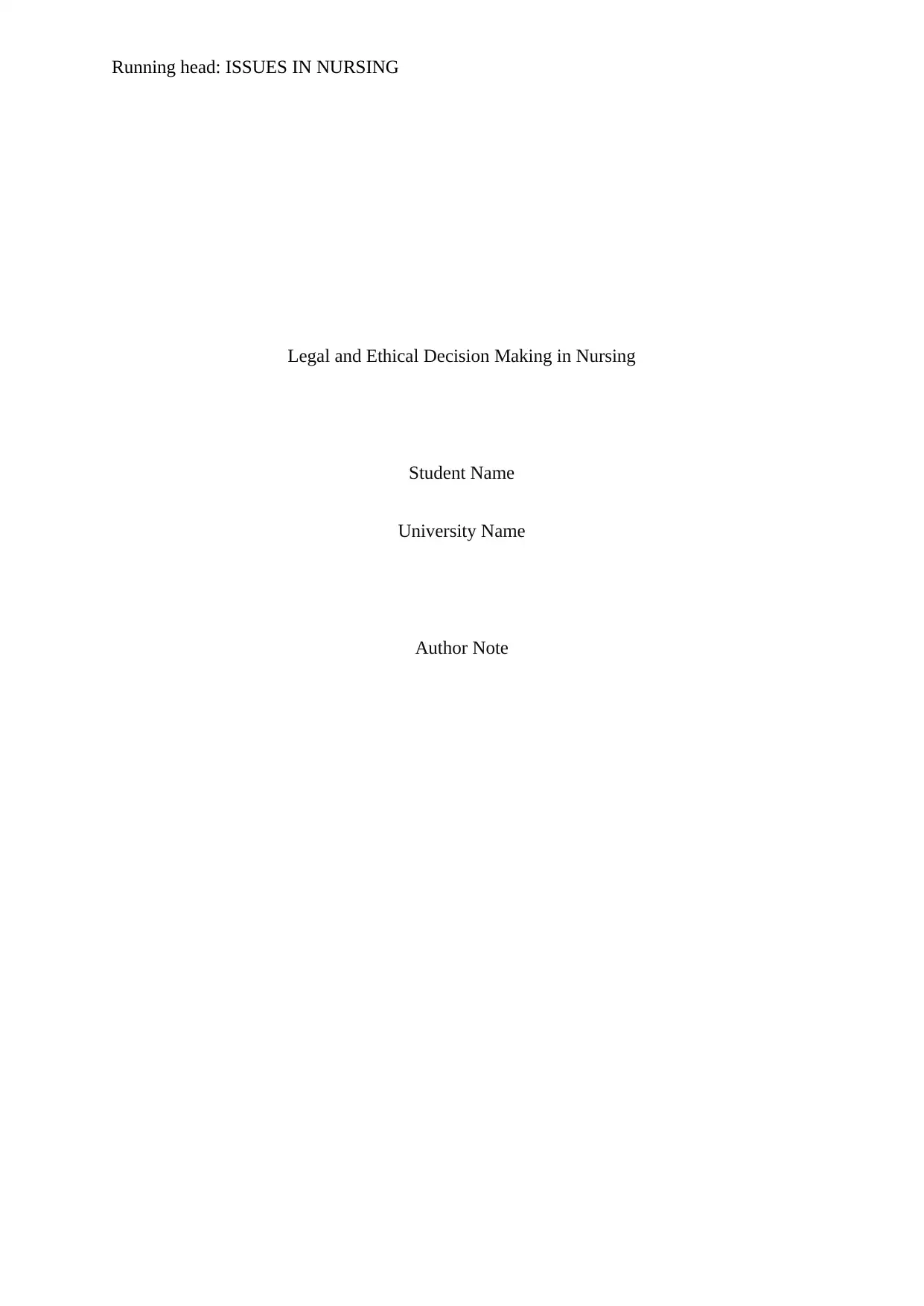
Running head: ISSUES IN NURSING
Legal and Ethical Decision Making in Nursing
Student Name
University Name
Author Note
Legal and Ethical Decision Making in Nursing
Student Name
University Name
Author Note
Secure Best Marks with AI Grader
Need help grading? Try our AI Grader for instant feedback on your assignments.
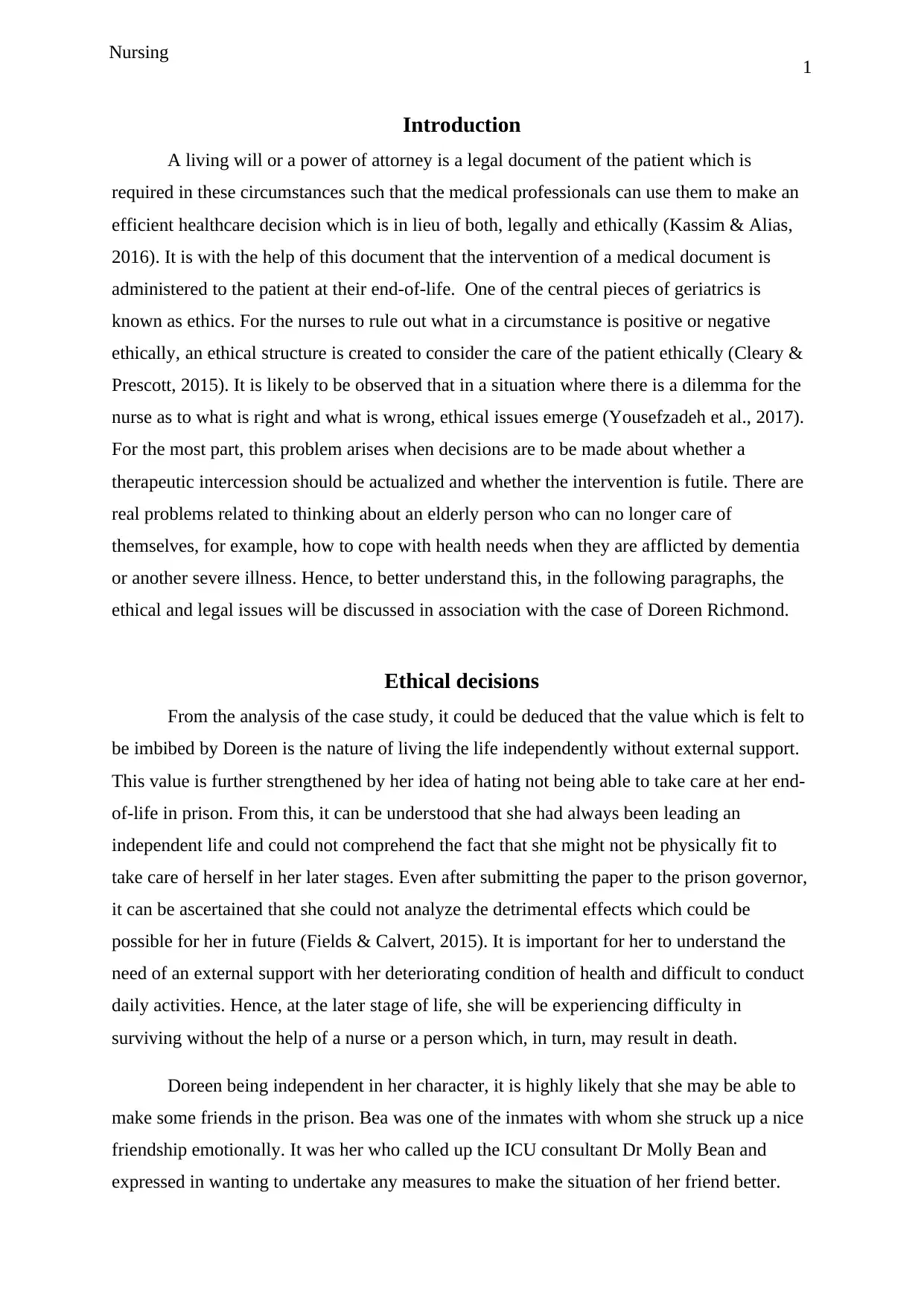
1
Introduction
A living will or a power of attorney is a legal document of the patient which is
required in these circumstances such that the medical professionals can use them to make an
efficient healthcare decision which is in lieu of both, legally and ethically (Kassim & Alias,
2016). It is with the help of this document that the intervention of a medical document is
administered to the patient at their end-of-life. One of the central pieces of geriatrics is
known as ethics. For the nurses to rule out what in a circumstance is positive or negative
ethically, an ethical structure is created to consider the care of the patient ethically (Cleary &
Prescott, 2015). It is likely to be observed that in a situation where there is a dilemma for the
nurse as to what is right and what is wrong, ethical issues emerge (Yousefzadeh et al., 2017).
For the most part, this problem arises when decisions are to be made about whether a
therapeutic intercession should be actualized and whether the intervention is futile. There are
real problems related to thinking about an elderly person who can no longer care of
themselves, for example, how to cope with health needs when they are afflicted by dementia
or another severe illness. Hence, to better understand this, in the following paragraphs, the
ethical and legal issues will be discussed in association with the case of Doreen Richmond.
Ethical decisions
From the analysis of the case study, it could be deduced that the value which is felt to
be imbibed by Doreen is the nature of living the life independently without external support.
This value is further strengthened by her idea of hating not being able to take care at her end-
of-life in prison. From this, it can be understood that she had always been leading an
independent life and could not comprehend the fact that she might not be physically fit to
take care of herself in her later stages. Even after submitting the paper to the prison governor,
it can be ascertained that she could not analyze the detrimental effects which could be
possible for her in future (Fields & Calvert, 2015). It is important for her to understand the
need of an external support with her deteriorating condition of health and difficult to conduct
daily activities. Hence, at the later stage of life, she will be experiencing difficulty in
surviving without the help of a nurse or a person which, in turn, may result in death.
Doreen being independent in her character, it is highly likely that she may be able to
make some friends in the prison. Bea was one of the inmates with whom she struck up a nice
friendship emotionally. It was her who called up the ICU consultant Dr Molly Bean and
expressed in wanting to undertake any measures to make the situation of her friend better.
Nursing
Introduction
A living will or a power of attorney is a legal document of the patient which is
required in these circumstances such that the medical professionals can use them to make an
efficient healthcare decision which is in lieu of both, legally and ethically (Kassim & Alias,
2016). It is with the help of this document that the intervention of a medical document is
administered to the patient at their end-of-life. One of the central pieces of geriatrics is
known as ethics. For the nurses to rule out what in a circumstance is positive or negative
ethically, an ethical structure is created to consider the care of the patient ethically (Cleary &
Prescott, 2015). It is likely to be observed that in a situation where there is a dilemma for the
nurse as to what is right and what is wrong, ethical issues emerge (Yousefzadeh et al., 2017).
For the most part, this problem arises when decisions are to be made about whether a
therapeutic intercession should be actualized and whether the intervention is futile. There are
real problems related to thinking about an elderly person who can no longer care of
themselves, for example, how to cope with health needs when they are afflicted by dementia
or another severe illness. Hence, to better understand this, in the following paragraphs, the
ethical and legal issues will be discussed in association with the case of Doreen Richmond.
Ethical decisions
From the analysis of the case study, it could be deduced that the value which is felt to
be imbibed by Doreen is the nature of living the life independently without external support.
This value is further strengthened by her idea of hating not being able to take care at her end-
of-life in prison. From this, it can be understood that she had always been leading an
independent life and could not comprehend the fact that she might not be physically fit to
take care of herself in her later stages. Even after submitting the paper to the prison governor,
it can be ascertained that she could not analyze the detrimental effects which could be
possible for her in future (Fields & Calvert, 2015). It is important for her to understand the
need of an external support with her deteriorating condition of health and difficult to conduct
daily activities. Hence, at the later stage of life, she will be experiencing difficulty in
surviving without the help of a nurse or a person which, in turn, may result in death.
Doreen being independent in her character, it is highly likely that she may be able to
make some friends in the prison. Bea was one of the inmates with whom she struck up a nice
friendship emotionally. It was her who called up the ICU consultant Dr Molly Bean and
expressed in wanting to undertake any measures to make the situation of her friend better.
Nursing
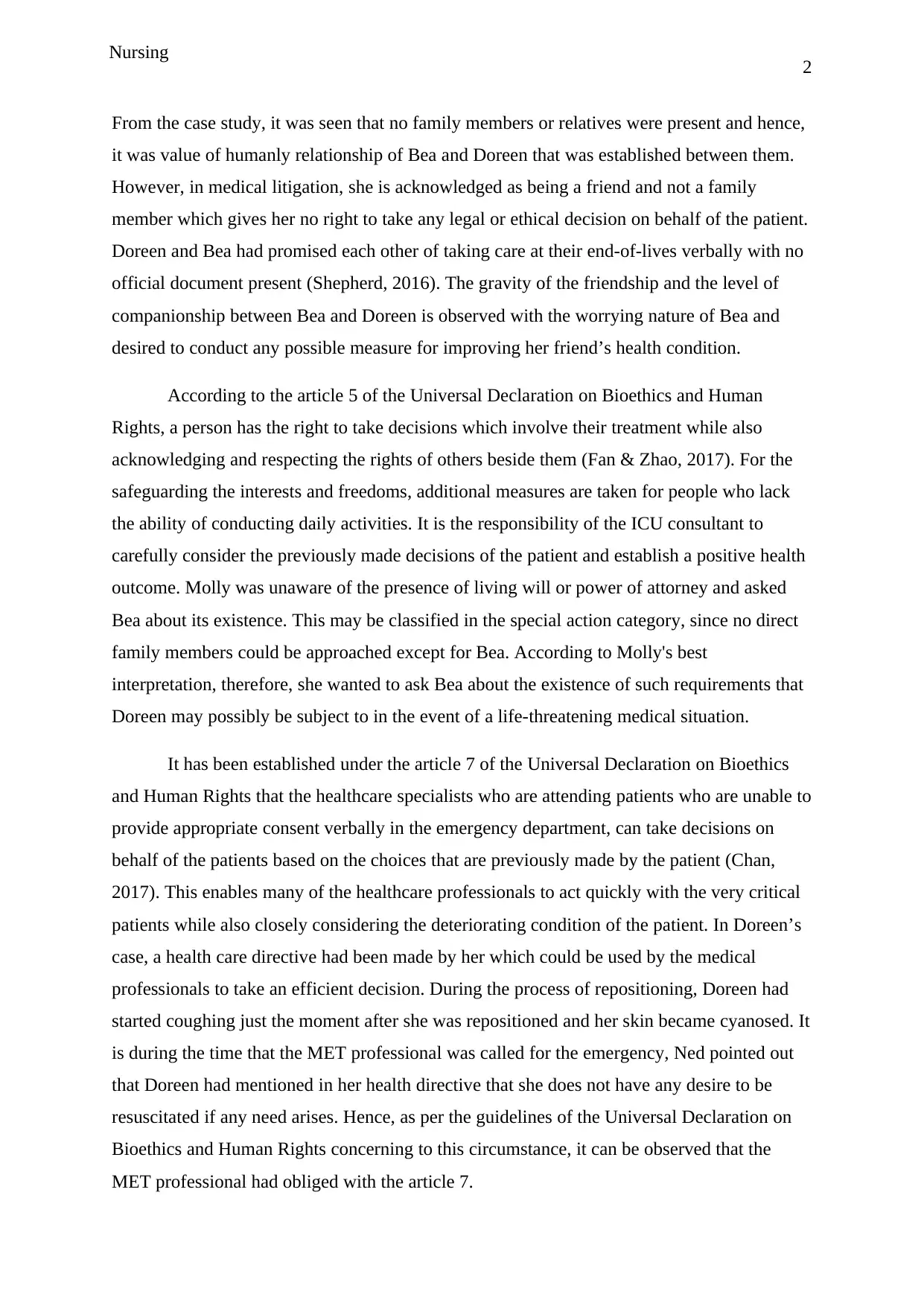
2
From the case study, it was seen that no family members or relatives were present and hence,
it was value of humanly relationship of Bea and Doreen that was established between them.
However, in medical litigation, she is acknowledged as being a friend and not a family
member which gives her no right to take any legal or ethical decision on behalf of the patient.
Doreen and Bea had promised each other of taking care at their end-of-lives verbally with no
official document present (Shepherd, 2016). The gravity of the friendship and the level of
companionship between Bea and Doreen is observed with the worrying nature of Bea and
desired to conduct any possible measure for improving her friend’s health condition.
According to the article 5 of the Universal Declaration on Bioethics and Human
Rights, a person has the right to take decisions which involve their treatment while also
acknowledging and respecting the rights of others beside them (Fan & Zhao, 2017). For the
safeguarding the interests and freedoms, additional measures are taken for people who lack
the ability of conducting daily activities. It is the responsibility of the ICU consultant to
carefully consider the previously made decisions of the patient and establish a positive health
outcome. Molly was unaware of the presence of living will or power of attorney and asked
Bea about its existence. This may be classified in the special action category, since no direct
family members could be approached except for Bea. According to Molly's best
interpretation, therefore, she wanted to ask Bea about the existence of such requirements that
Doreen may possibly be subject to in the event of a life-threatening medical situation.
It has been established under the article 7 of the Universal Declaration on Bioethics
and Human Rights that the healthcare specialists who are attending patients who are unable to
provide appropriate consent verbally in the emergency department, can take decisions on
behalf of the patients based on the choices that are previously made by the patient (Chan,
2017). This enables many of the healthcare professionals to act quickly with the very critical
patients while also closely considering the deteriorating condition of the patient. In Doreen’s
case, a health care directive had been made by her which could be used by the medical
professionals to take an efficient decision. During the process of repositioning, Doreen had
started coughing just the moment after she was repositioned and her skin became cyanosed. It
is during the time that the MET professional was called for the emergency, Ned pointed out
that Doreen had mentioned in her health directive that she does not have any desire to be
resuscitated if any need arises. Hence, as per the guidelines of the Universal Declaration on
Bioethics and Human Rights concerning to this circumstance, it can be observed that the
MET professional had obliged with the article 7.
Nursing
From the case study, it was seen that no family members or relatives were present and hence,
it was value of humanly relationship of Bea and Doreen that was established between them.
However, in medical litigation, she is acknowledged as being a friend and not a family
member which gives her no right to take any legal or ethical decision on behalf of the patient.
Doreen and Bea had promised each other of taking care at their end-of-lives verbally with no
official document present (Shepherd, 2016). The gravity of the friendship and the level of
companionship between Bea and Doreen is observed with the worrying nature of Bea and
desired to conduct any possible measure for improving her friend’s health condition.
According to the article 5 of the Universal Declaration on Bioethics and Human
Rights, a person has the right to take decisions which involve their treatment while also
acknowledging and respecting the rights of others beside them (Fan & Zhao, 2017). For the
safeguarding the interests and freedoms, additional measures are taken for people who lack
the ability of conducting daily activities. It is the responsibility of the ICU consultant to
carefully consider the previously made decisions of the patient and establish a positive health
outcome. Molly was unaware of the presence of living will or power of attorney and asked
Bea about its existence. This may be classified in the special action category, since no direct
family members could be approached except for Bea. According to Molly's best
interpretation, therefore, she wanted to ask Bea about the existence of such requirements that
Doreen may possibly be subject to in the event of a life-threatening medical situation.
It has been established under the article 7 of the Universal Declaration on Bioethics
and Human Rights that the healthcare specialists who are attending patients who are unable to
provide appropriate consent verbally in the emergency department, can take decisions on
behalf of the patients based on the choices that are previously made by the patient (Chan,
2017). This enables many of the healthcare professionals to act quickly with the very critical
patients while also closely considering the deteriorating condition of the patient. In Doreen’s
case, a health care directive had been made by her which could be used by the medical
professionals to take an efficient decision. During the process of repositioning, Doreen had
started coughing just the moment after she was repositioned and her skin became cyanosed. It
is during the time that the MET professional was called for the emergency, Ned pointed out
that Doreen had mentioned in her health directive that she does not have any desire to be
resuscitated if any need arises. Hence, as per the guidelines of the Universal Declaration on
Bioethics and Human Rights concerning to this circumstance, it can be observed that the
MET professional had obliged with the article 7.
Nursing
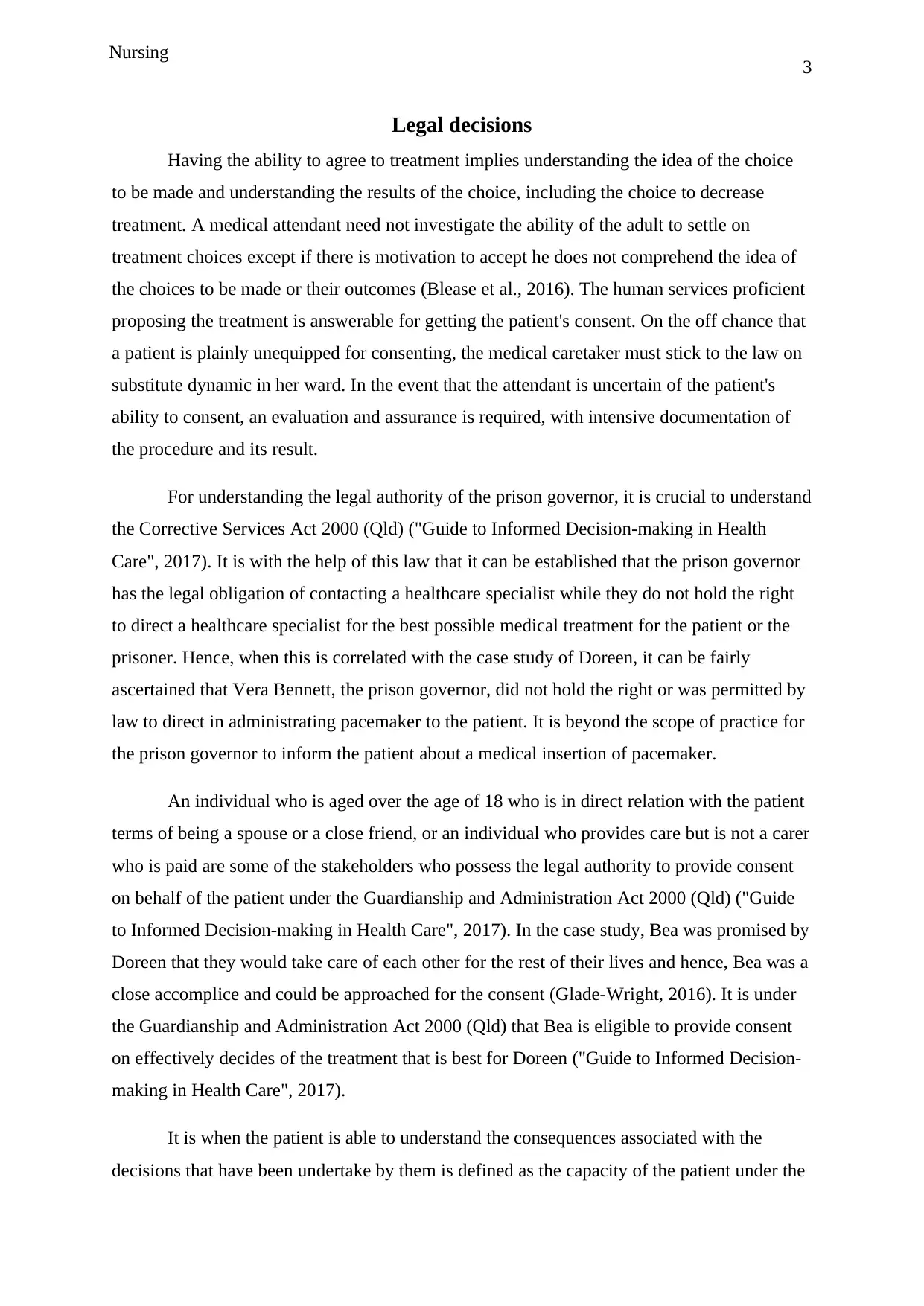
3
Legal decisions
Having the ability to agree to treatment implies understanding the idea of the choice
to be made and understanding the results of the choice, including the choice to decrease
treatment. A medical attendant need not investigate the ability of the adult to settle on
treatment choices except if there is motivation to accept he does not comprehend the idea of
the choices to be made or their outcomes (Blease et al., 2016). The human services proficient
proposing the treatment is answerable for getting the patient's consent. On the off chance that
a patient is plainly unequipped for consenting, the medical caretaker must stick to the law on
substitute dynamic in her ward. In the event that the attendant is uncertain of the patient's
ability to consent, an evaluation and assurance is required, with intensive documentation of
the procedure and its result.
For understanding the legal authority of the prison governor, it is crucial to understand
the Corrective Services Act 2000 (Qld) ("Guide to Informed Decision-making in Health
Care", 2017). It is with the help of this law that it can be established that the prison governor
has the legal obligation of contacting a healthcare specialist while they do not hold the right
to direct a healthcare specialist for the best possible medical treatment for the patient or the
prisoner. Hence, when this is correlated with the case study of Doreen, it can be fairly
ascertained that Vera Bennett, the prison governor, did not hold the right or was permitted by
law to direct in administrating pacemaker to the patient. It is beyond the scope of practice for
the prison governor to inform the patient about a medical insertion of pacemaker.
An individual who is aged over the age of 18 who is in direct relation with the patient
terms of being a spouse or a close friend, or an individual who provides care but is not a carer
who is paid are some of the stakeholders who possess the legal authority to provide consent
on behalf of the patient under the Guardianship and Administration Act 2000 (Qld) ("Guide
to Informed Decision-making in Health Care", 2017). In the case study, Bea was promised by
Doreen that they would take care of each other for the rest of their lives and hence, Bea was a
close accomplice and could be approached for the consent (Glade-Wright, 2016). It is under
the Guardianship and Administration Act 2000 (Qld) that Bea is eligible to provide consent
on effectively decides of the treatment that is best for Doreen ("Guide to Informed Decision-
making in Health Care", 2017).
It is when the patient is able to understand the consequences associated with the
decisions that have been undertake by them is defined as the capacity of the patient under the
Nursing
Legal decisions
Having the ability to agree to treatment implies understanding the idea of the choice
to be made and understanding the results of the choice, including the choice to decrease
treatment. A medical attendant need not investigate the ability of the adult to settle on
treatment choices except if there is motivation to accept he does not comprehend the idea of
the choices to be made or their outcomes (Blease et al., 2016). The human services proficient
proposing the treatment is answerable for getting the patient's consent. On the off chance that
a patient is plainly unequipped for consenting, the medical caretaker must stick to the law on
substitute dynamic in her ward. In the event that the attendant is uncertain of the patient's
ability to consent, an evaluation and assurance is required, with intensive documentation of
the procedure and its result.
For understanding the legal authority of the prison governor, it is crucial to understand
the Corrective Services Act 2000 (Qld) ("Guide to Informed Decision-making in Health
Care", 2017). It is with the help of this law that it can be established that the prison governor
has the legal obligation of contacting a healthcare specialist while they do not hold the right
to direct a healthcare specialist for the best possible medical treatment for the patient or the
prisoner. Hence, when this is correlated with the case study of Doreen, it can be fairly
ascertained that Vera Bennett, the prison governor, did not hold the right or was permitted by
law to direct in administrating pacemaker to the patient. It is beyond the scope of practice for
the prison governor to inform the patient about a medical insertion of pacemaker.
An individual who is aged over the age of 18 who is in direct relation with the patient
terms of being a spouse or a close friend, or an individual who provides care but is not a carer
who is paid are some of the stakeholders who possess the legal authority to provide consent
on behalf of the patient under the Guardianship and Administration Act 2000 (Qld) ("Guide
to Informed Decision-making in Health Care", 2017). In the case study, Bea was promised by
Doreen that they would take care of each other for the rest of their lives and hence, Bea was a
close accomplice and could be approached for the consent (Glade-Wright, 2016). It is under
the Guardianship and Administration Act 2000 (Qld) that Bea is eligible to provide consent
on effectively decides of the treatment that is best for Doreen ("Guide to Informed Decision-
making in Health Care", 2017).
It is when the patient is able to understand the consequences associated with the
decisions that have been undertake by them is defined as the capacity of the patient under the
Nursing
Secure Best Marks with AI Grader
Need help grading? Try our AI Grader for instant feedback on your assignments.
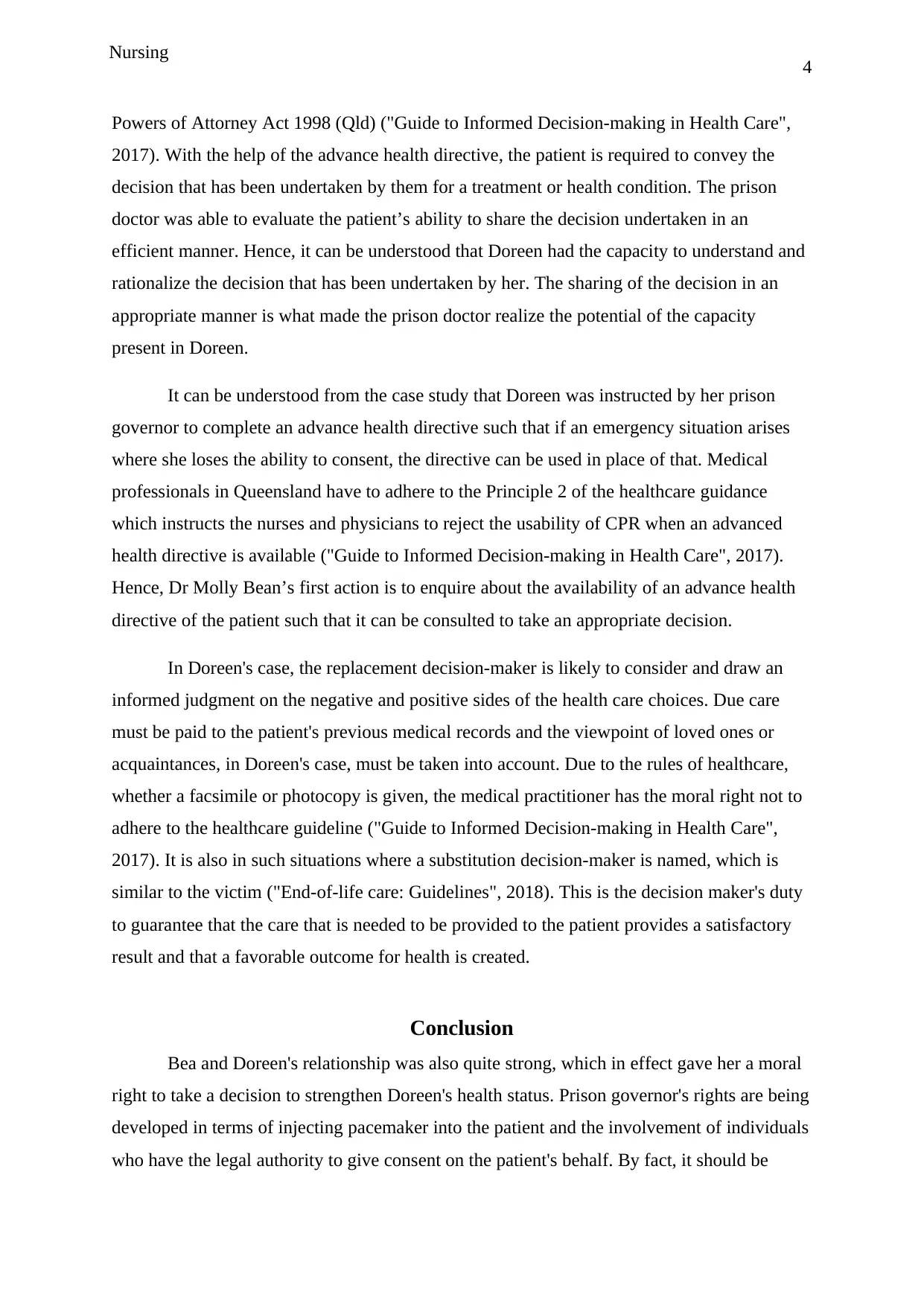
4
Powers of Attorney Act 1998 (Qld) ("Guide to Informed Decision-making in Health Care",
2017). With the help of the advance health directive, the patient is required to convey the
decision that has been undertaken by them for a treatment or health condition. The prison
doctor was able to evaluate the patient’s ability to share the decision undertaken in an
efficient manner. Hence, it can be understood that Doreen had the capacity to understand and
rationalize the decision that has been undertaken by her. The sharing of the decision in an
appropriate manner is what made the prison doctor realize the potential of the capacity
present in Doreen.
It can be understood from the case study that Doreen was instructed by her prison
governor to complete an advance health directive such that if an emergency situation arises
where she loses the ability to consent, the directive can be used in place of that. Medical
professionals in Queensland have to adhere to the Principle 2 of the healthcare guidance
which instructs the nurses and physicians to reject the usability of CPR when an advanced
health directive is available ("Guide to Informed Decision-making in Health Care", 2017).
Hence, Dr Molly Bean’s first action is to enquire about the availability of an advance health
directive of the patient such that it can be consulted to take an appropriate decision.
In Doreen's case, the replacement decision-maker is likely to consider and draw an
informed judgment on the negative and positive sides of the health care choices. Due care
must be paid to the patient's previous medical records and the viewpoint of loved ones or
acquaintances, in Doreen's case, must be taken into account. Due to the rules of healthcare,
whether a facsimile or photocopy is given, the medical practitioner has the moral right not to
adhere to the healthcare guideline ("Guide to Informed Decision-making in Health Care",
2017). It is also in such situations where a substitution decision-maker is named, which is
similar to the victim ("End-of-life care: Guidelines", 2018). This is the decision maker's duty
to guarantee that the care that is needed to be provided to the patient provides a satisfactory
result and that a favorable outcome for health is created.
Conclusion
Bea and Doreen's relationship was also quite strong, which in effect gave her a moral
right to take a decision to strengthen Doreen's health status. Prison governor's rights are being
developed in terms of injecting pacemaker into the patient and the involvement of individuals
who have the legal authority to give consent on the patient's behalf. By fact, it should be
Nursing
Powers of Attorney Act 1998 (Qld) ("Guide to Informed Decision-making in Health Care",
2017). With the help of the advance health directive, the patient is required to convey the
decision that has been undertaken by them for a treatment or health condition. The prison
doctor was able to evaluate the patient’s ability to share the decision undertaken in an
efficient manner. Hence, it can be understood that Doreen had the capacity to understand and
rationalize the decision that has been undertaken by her. The sharing of the decision in an
appropriate manner is what made the prison doctor realize the potential of the capacity
present in Doreen.
It can be understood from the case study that Doreen was instructed by her prison
governor to complete an advance health directive such that if an emergency situation arises
where she loses the ability to consent, the directive can be used in place of that. Medical
professionals in Queensland have to adhere to the Principle 2 of the healthcare guidance
which instructs the nurses and physicians to reject the usability of CPR when an advanced
health directive is available ("Guide to Informed Decision-making in Health Care", 2017).
Hence, Dr Molly Bean’s first action is to enquire about the availability of an advance health
directive of the patient such that it can be consulted to take an appropriate decision.
In Doreen's case, the replacement decision-maker is likely to consider and draw an
informed judgment on the negative and positive sides of the health care choices. Due care
must be paid to the patient's previous medical records and the viewpoint of loved ones or
acquaintances, in Doreen's case, must be taken into account. Due to the rules of healthcare,
whether a facsimile or photocopy is given, the medical practitioner has the moral right not to
adhere to the healthcare guideline ("Guide to Informed Decision-making in Health Care",
2017). It is also in such situations where a substitution decision-maker is named, which is
similar to the victim ("End-of-life care: Guidelines", 2018). This is the decision maker's duty
to guarantee that the care that is needed to be provided to the patient provides a satisfactory
result and that a favorable outcome for health is created.
Conclusion
Bea and Doreen's relationship was also quite strong, which in effect gave her a moral
right to take a decision to strengthen Doreen's health status. Prison governor's rights are being
developed in terms of injecting pacemaker into the patient and the involvement of individuals
who have the legal authority to give consent on the patient's behalf. By fact, it should be
Nursing
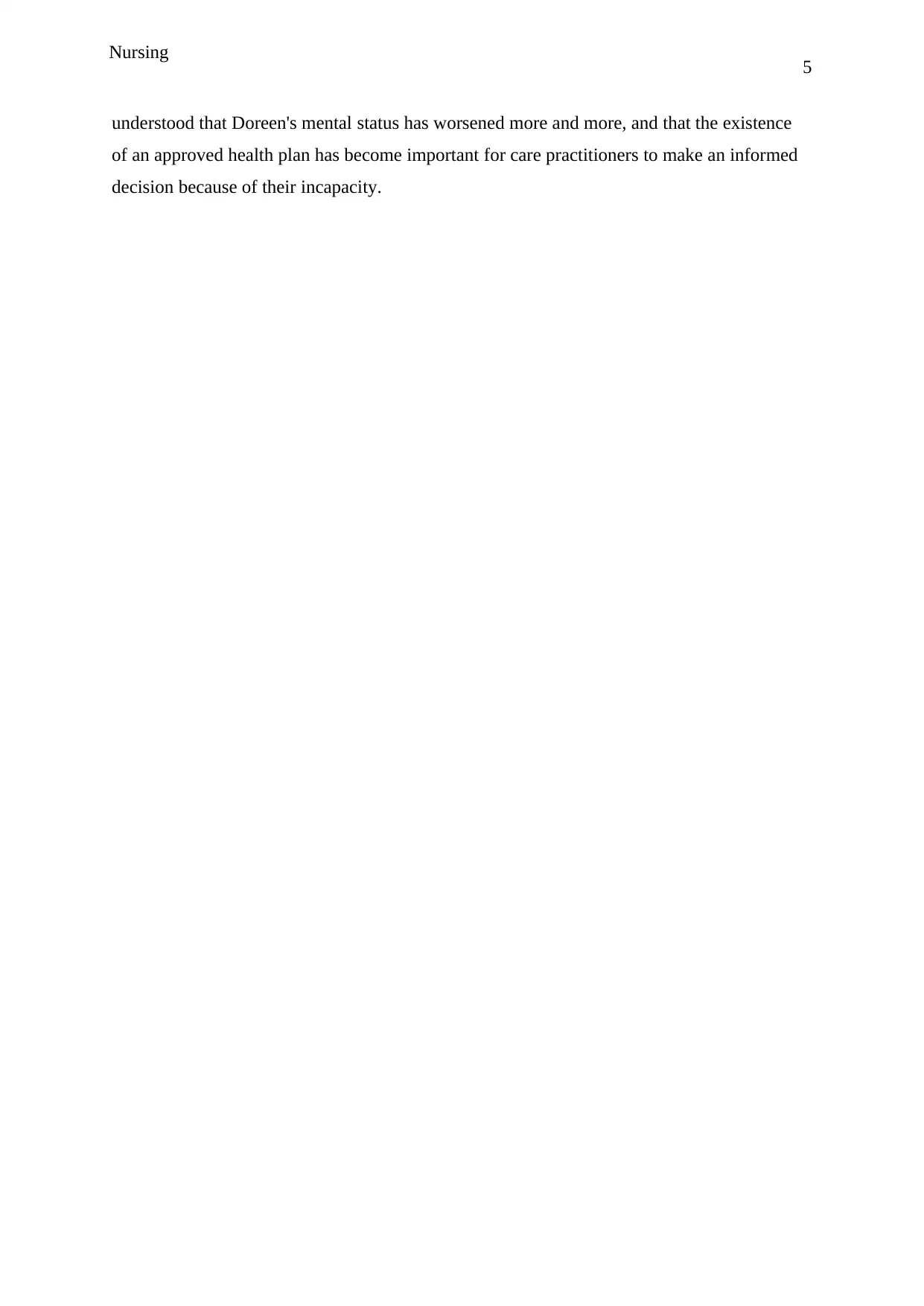
5
understood that Doreen's mental status has worsened more and more, and that the existence
of an approved health plan has become important for care practitioners to make an informed
decision because of their incapacity.
Nursing
understood that Doreen's mental status has worsened more and more, and that the existence
of an approved health plan has become important for care practitioners to make an informed
decision because of their incapacity.
Nursing
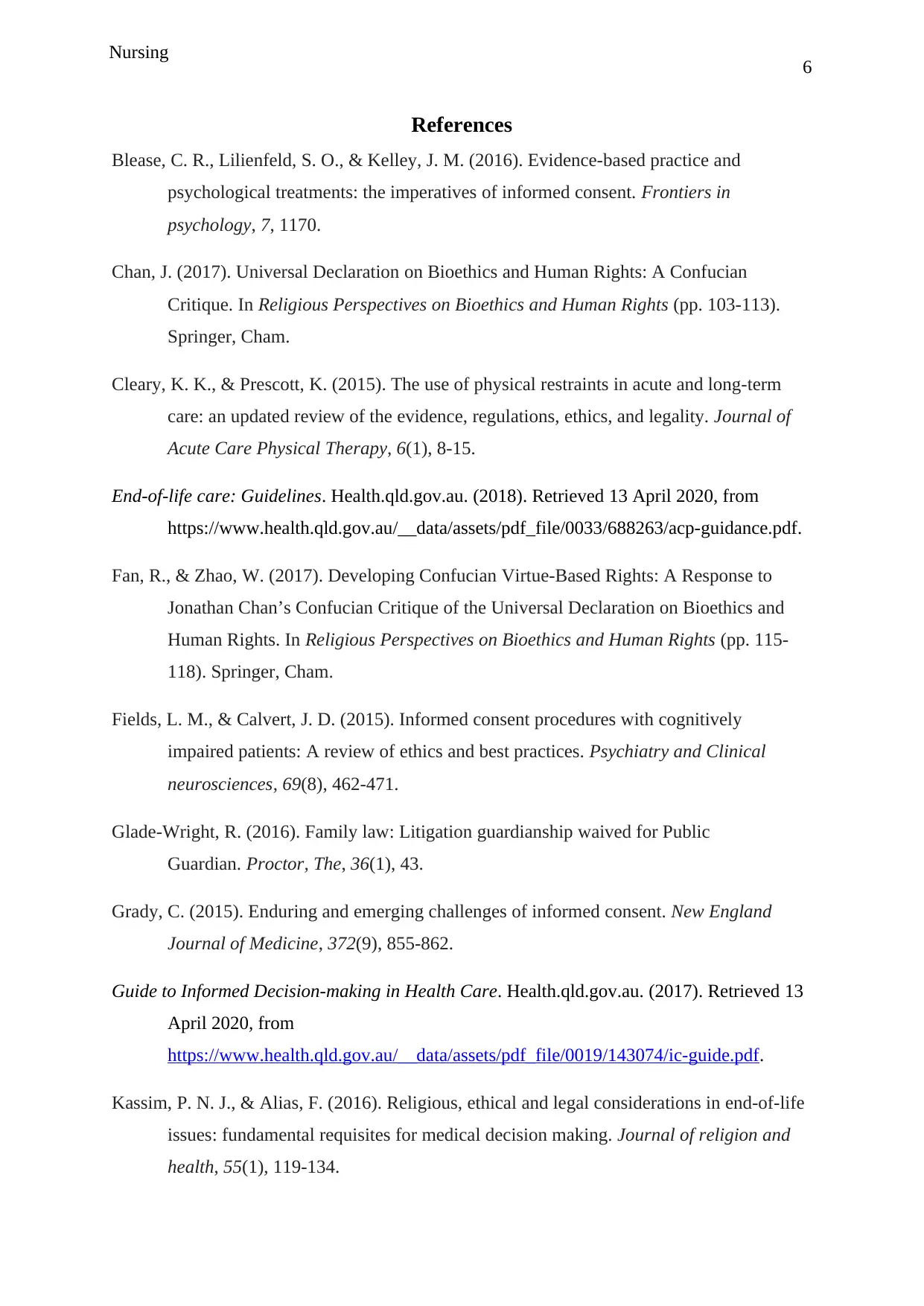
6
References
Blease, C. R., Lilienfeld, S. O., & Kelley, J. M. (2016). Evidence-based practice and
psychological treatments: the imperatives of informed consent. Frontiers in
psychology, 7, 1170.
Chan, J. (2017). Universal Declaration on Bioethics and Human Rights: A Confucian
Critique. In Religious Perspectives on Bioethics and Human Rights (pp. 103-113).
Springer, Cham.
Cleary, K. K., & Prescott, K. (2015). The use of physical restraints in acute and long-term
care: an updated review of the evidence, regulations, ethics, and legality. Journal of
Acute Care Physical Therapy, 6(1), 8-15.
End-of-life care: Guidelines. Health.qld.gov.au. (2018). Retrieved 13 April 2020, from
https://www.health.qld.gov.au/__data/assets/pdf_file/0033/688263/acp-guidance.pdf.
Fan, R., & Zhao, W. (2017). Developing Confucian Virtue-Based Rights: A Response to
Jonathan Chan’s Confucian Critique of the Universal Declaration on Bioethics and
Human Rights. In Religious Perspectives on Bioethics and Human Rights (pp. 115-
118). Springer, Cham.
Fields, L. M., & Calvert, J. D. (2015). Informed consent procedures with cognitively
impaired patients: A review of ethics and best practices. Psychiatry and Clinical
neurosciences, 69(8), 462-471.
Glade-Wright, R. (2016). Family law: Litigation guardianship waived for Public
Guardian. Proctor, The, 36(1), 43.
Grady, C. (2015). Enduring and emerging challenges of informed consent. New England
Journal of Medicine, 372(9), 855-862.
Guide to Informed Decision-making in Health Care. Health.qld.gov.au. (2017). Retrieved 13
April 2020, from
https://www.health.qld.gov.au/__data/assets/pdf_file/0019/143074/ic-guide.pdf.
Kassim, P. N. J., & Alias, F. (2016). Religious, ethical and legal considerations in end-of-life
issues: fundamental requisites for medical decision making. Journal of religion and
health, 55(1), 119-134.
Nursing
References
Blease, C. R., Lilienfeld, S. O., & Kelley, J. M. (2016). Evidence-based practice and
psychological treatments: the imperatives of informed consent. Frontiers in
psychology, 7, 1170.
Chan, J. (2017). Universal Declaration on Bioethics and Human Rights: A Confucian
Critique. In Religious Perspectives on Bioethics and Human Rights (pp. 103-113).
Springer, Cham.
Cleary, K. K., & Prescott, K. (2015). The use of physical restraints in acute and long-term
care: an updated review of the evidence, regulations, ethics, and legality. Journal of
Acute Care Physical Therapy, 6(1), 8-15.
End-of-life care: Guidelines. Health.qld.gov.au. (2018). Retrieved 13 April 2020, from
https://www.health.qld.gov.au/__data/assets/pdf_file/0033/688263/acp-guidance.pdf.
Fan, R., & Zhao, W. (2017). Developing Confucian Virtue-Based Rights: A Response to
Jonathan Chan’s Confucian Critique of the Universal Declaration on Bioethics and
Human Rights. In Religious Perspectives on Bioethics and Human Rights (pp. 115-
118). Springer, Cham.
Fields, L. M., & Calvert, J. D. (2015). Informed consent procedures with cognitively
impaired patients: A review of ethics and best practices. Psychiatry and Clinical
neurosciences, 69(8), 462-471.
Glade-Wright, R. (2016). Family law: Litigation guardianship waived for Public
Guardian. Proctor, The, 36(1), 43.
Grady, C. (2015). Enduring and emerging challenges of informed consent. New England
Journal of Medicine, 372(9), 855-862.
Guide to Informed Decision-making in Health Care. Health.qld.gov.au. (2017). Retrieved 13
April 2020, from
https://www.health.qld.gov.au/__data/assets/pdf_file/0019/143074/ic-guide.pdf.
Kassim, P. N. J., & Alias, F. (2016). Religious, ethical and legal considerations in end-of-life
issues: fundamental requisites for medical decision making. Journal of religion and
health, 55(1), 119-134.
Nursing
Paraphrase This Document
Need a fresh take? Get an instant paraphrase of this document with our AI Paraphraser
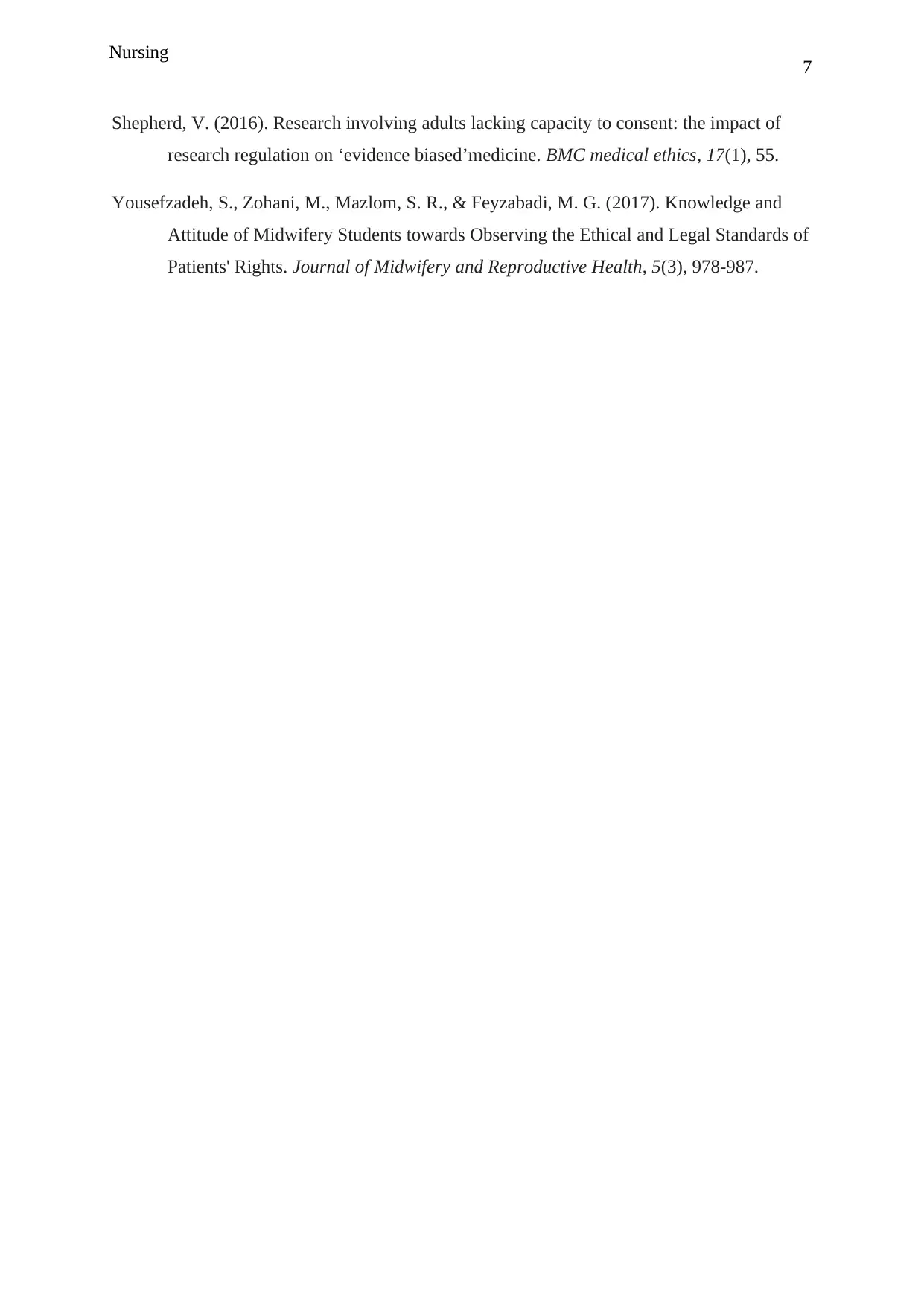
7
Shepherd, V. (2016). Research involving adults lacking capacity to consent: the impact of
research regulation on ‘evidence biased’medicine. BMC medical ethics, 17(1), 55.
Yousefzadeh, S., Zohani, M., Mazlom, S. R., & Feyzabadi, M. G. (2017). Knowledge and
Attitude of Midwifery Students towards Observing the Ethical and Legal Standards of
Patients' Rights. Journal of Midwifery and Reproductive Health, 5(3), 978-987.
Nursing
Shepherd, V. (2016). Research involving adults lacking capacity to consent: the impact of
research regulation on ‘evidence biased’medicine. BMC medical ethics, 17(1), 55.
Yousefzadeh, S., Zohani, M., Mazlom, S. R., & Feyzabadi, M. G. (2017). Knowledge and
Attitude of Midwifery Students towards Observing the Ethical and Legal Standards of
Patients' Rights. Journal of Midwifery and Reproductive Health, 5(3), 978-987.
Nursing
1 out of 8
Related Documents
Your All-in-One AI-Powered Toolkit for Academic Success.
+13062052269
info@desklib.com
Available 24*7 on WhatsApp / Email
![[object Object]](/_next/static/media/star-bottom.7253800d.svg)
Unlock your academic potential
© 2024 | Zucol Services PVT LTD | All rights reserved.





